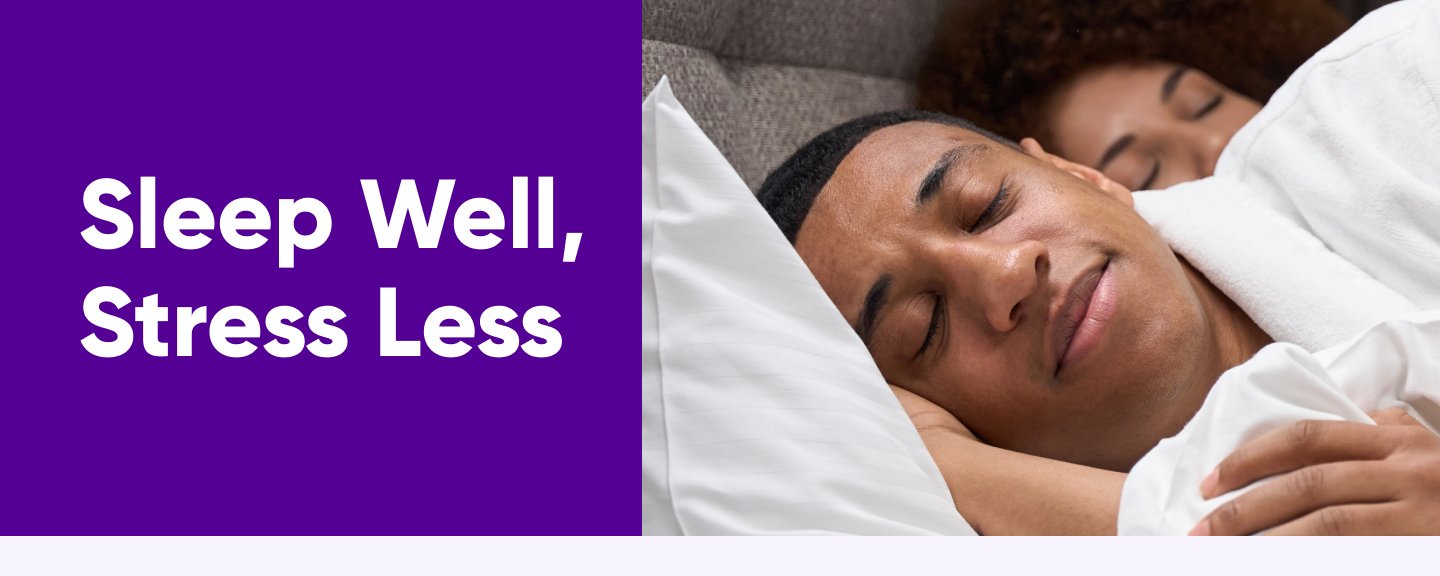Sleep Well, Stress Less

Studies show that 3 in 5 Americans say their stress negatively impacts their daily lives1, and 1 in 3 Americans aren’t getting enough sleep every day2. Managing our stress is crucial to our health, our work, our relationships, and our overall happiness. Sleep plays a huge role in our stress.
Everyone copes with stress differently, and there isn’t a one-size-fits-all solution, or an on and off switch. That being said, one of the best things you can do to help manage your stress is to take control of your sleep.
In this article, we’ll cover everything you need to know about how sleep can help you manage your stress and give you some tips to help improve your sleep.
The Benefits of a Good Night's Sleep

Getting enough sleep is critical for your physical, mental, and emotional health. When we sleep, our body repairs, relaxes, and recharges itself. This can go a long way in helping us to manage or even reverse the effects of stress.
Benefit #1: Physical Restoration
When we sleep, our body undergoes processes of repair and restoration3, crucial for maintaining our physical health and managing our stress. Good-quality sleep can:
- Heal and repair blood vessels and muscles
- Support growth and development
- Increase our ability to fight off germs
- Decrease our risk of health problems
Studies have shown that quality sleep can even help us control our appetite. Two of the hormones that affect our appetite are ghrelin, which makes us feel hungry, and leptin, which makes us feel full3. When we get regular amounts of quality sleep, these hormones are more balanced in our bodies than when we don’t.
Good quality sleep is an essential pillar of physical health, affecting everything from physical recovery to our immune systems to our appetites, leaving us better equipped to handle our stress.
Benefit #2: Cognitive Function
Have you ever noticed that after a good night’s sleep, you are able to think more clearly? That’s because sleep plays a vital role in cognitive function4. Sleep brings rest, recovery, and rejuvenation not only to our bodies but to our minds as well. The mental benefits of sleep include:
- Memory consolidation
- Increased problem-solving abilities
- Enhanced concentration
When we give our brains the rest they need, it’s easier for us to learn, to make decisions, to remember, and to solve problems5, all of which are skills we need when it comes to managing our stress.
Benefit #3: Emotional Regulation
There’s a reason why people say that “things will feel better in the morning.” Emotional regulation is another crucial aspect of our overall health that is deeply affected by sleep.
When we’re sleep-deprived, our emotional resilience and tolerance take a hit, which can leave us prone to:
- Mood swings
- Irritability
- Increased stress
Studies have shown a direct correlation between improved sleep quality and reduced feelings of stress, depression, and anxiety. This means that sleep doesn’t only help us deal with the effects of stress, but it can actually reduce feelings of stress6.
Strategies for Improving Sleep

Now that we understand why quality sleep is important and its impact on our ability to manage and reduce stress, let’s explore some practical strategies for improving sleep.
By putting these strategies into practice, you can create a nurturing bedtime routine and peaceful sleep environment that will empower you to manage the stress in your life more effectively.
Tip #1: Establish a Consistent Sleep Schedule
- Go to bed at the same time every night
- Get up at the same time each morning
- Keep a sleep journal
Going to bed and waking up at the same time every day, even on weekends is the first step in creating a sustainable routine. Consistency helps regulate your body’s internal clock and reinforces healthy sleep-wake cycles. Aim for 7-9 hours of sleep a night to ensure optimal rest.
Keeping a sleep journal can help you recognize patterns in your sleeping habits and make you aware of the small details that impact your sleep such as:
- Time you go to bed
- Time you wake up
- How long it takes you to fall asleep
- Number and duration of sleep interruptions
- Number and duration of daytime naps
- How much and when you consume caffeine, alcohol, or tobacco
- Daily medications
- Daily exercise
These smaller factors will affect everyone differently, and keeping a sleep journal will help you better understand what works best for you.
Tip #2: Create a Restful Environment
- Keep your bedroom cool and dim
- Get rid of outside noisy distractions
- Invest in comfortable bedding
- Don’t use technology in bed for work or for play
- Don’t lie in bed awake
Where you sleep is arguably more important than when you sleep. Our advice is to create an environment dedicated to sleep, rest, and relaxation. We tend to sleep best in rooms that are quiet, cool, and comfortable. Because of this, we recommend investing in comfortable bedding.
To block out disruptive noises, consider white noise machines or earplugs if necessary. We’ll talk about technology and screen time in a moment, but don’t bring your laptop to bed. If you’re having trouble sleeping, get out of bed and do something else like read, listen to music, or do light stretches7.
Tip #3: Limit Screen Time Before Bed
- Turn your screens off at least an hour before bed
- Switch to mellow content as the end of screen time approaches
- Use blue light filters
- Keep a light on while you use technology
- Try listening instead of watching or reading
The problem with screen time before bedtime is the amount of blue light that phones, TVs, tablets, and computers emit. Blue light can negatively affect our sleep quality and our sleep duration8, which in turn negatively affects our ability to manage our stress.
We recommend avoiding screens at least an hour before bedtime and engage in relaxing activities instead, such as reading or practicing relaxation techniques like deep breathing or meditation.
Sleep Hygiene Checklist
We’ve covered some important tips to help you improve your sleep quality, establishing good sleep hygiene practices depends on a lot of factors.
Here’s a simple checklist that covers everything we’ve gone over so far plus some extra tips to help you create the perfect sleep environment and routine for you:
Establish a Consistent Sleep Schedule
- Go to bed at the same time each night
- Wake up at the same time every morning — even on weekends
- Keep a sleep journal
- Create a relaxing bedtime routine
- Exercise regularly
- Avoid caffeine 6 hours before bedtime
Create a Restful Environment
- Keep your bedroom cool and dim
- Get rid of outside noisy distractions
- Invest in comfortable bedding
- Don’t use technology in bed for work or play
- Don’t lie in bed awake
- Avoid heavy, spicy, or sugary foods before bed
- Nap intentionally
Limit Screen Time Before Bed
- Turn your screens off at least an hour before bed
- Switch to mellow content as the end of screen time approaches
- Use blue light filters
- Keep a light on while you use technology
- Try listening instead of watching or reading
Featured Products
Nutricost’s Anti-Stress Bundle Can Help
By prioritizing your sleep and adopting the sleep strategies that work best for you, you’re not just investing in better rest; you’re investing in your own well-being, setting yourself up for success as you face each day with renewed energy and resilience.
Nutricost understands that quality sleep is just a part of holistic wellness, which is why we've curated the Anti-Stress Kit to support you on your journey to better health and less stress.
The Anti-Stress Kit
The Anti-Stress Kit has been curated to help you find balance, mindfulness, and a sense of relief from the stress of the daily grind. Our Anti-Stress Kit features Ashwagandha, L-Theanine, and Magnesium, as well as a free gratitude journal and stress management ebook, all of which can help you more effectively manage your stress.
Ashwagandha
Ashwagandha is an adaptogen that can increase your ability to cope with stress both physically and mentally9.
L-Theanine
L-Theanine can help to counteract the effects of stress hormones like cortisol, promoting a sense of calmness and well-being10.
Magnesium
Magnesium helps to modulate stress hormones like cortisol and adrenaline, ensuring that the stress response is properly balanced.
FREE Stress Management eBook
We wrote Managing Stress to help you better unwind, relax, and rejuvenate your mind, body, and spirit.
FREE Gratitude Journal
Focusing on what you are grateful for encourages a mindset of abundance and appreciation, shifting your thoughts towards a more positive outlook on life.
If you’re ready to take control of your stress and your sleep, it’s time to add Nutricost’s Anti-Stress Kit to your wellness routine and your new sleep strategies. Together, you’ll have the tools you need to prioritize self-care, improve your sleep, and tackle your stress.
References
- https://www.ipsos.com/en-us/news-polls/world-mental-health-day-monitor-2022
- https://www.nhlbi.nih.gov/health/sleep-deprivation#:~:text=According%20to%20the%20Centers%20for,at%20least%20once%20a%20month
- https://www.nhlbi.nih.gov/health/sleep-deprivation/health-effects
- https://www.ncbi.nlm.nih.gov/pmc/articles/PMC2656292/
- https://pubmed.ncbi.nlm.nih.gov/17212793/
- https://www.sciencedirect.com/science/article/pii/S1087079221001416?via%3Dihub#sec4
- https://www.ninds.nih.gov/health-information/public-education/brain-basics/brain-basics-understanding-sleep
- https://www.ncbi.nlm.nih.gov/pmc/articles/PMC9424753/
- https://onlinelibrary.wiley.com/doi/10.1002/ptr.7598
- https://www.ncbi.nlm.nih.gov/pmc/articles/PMC6836118/









